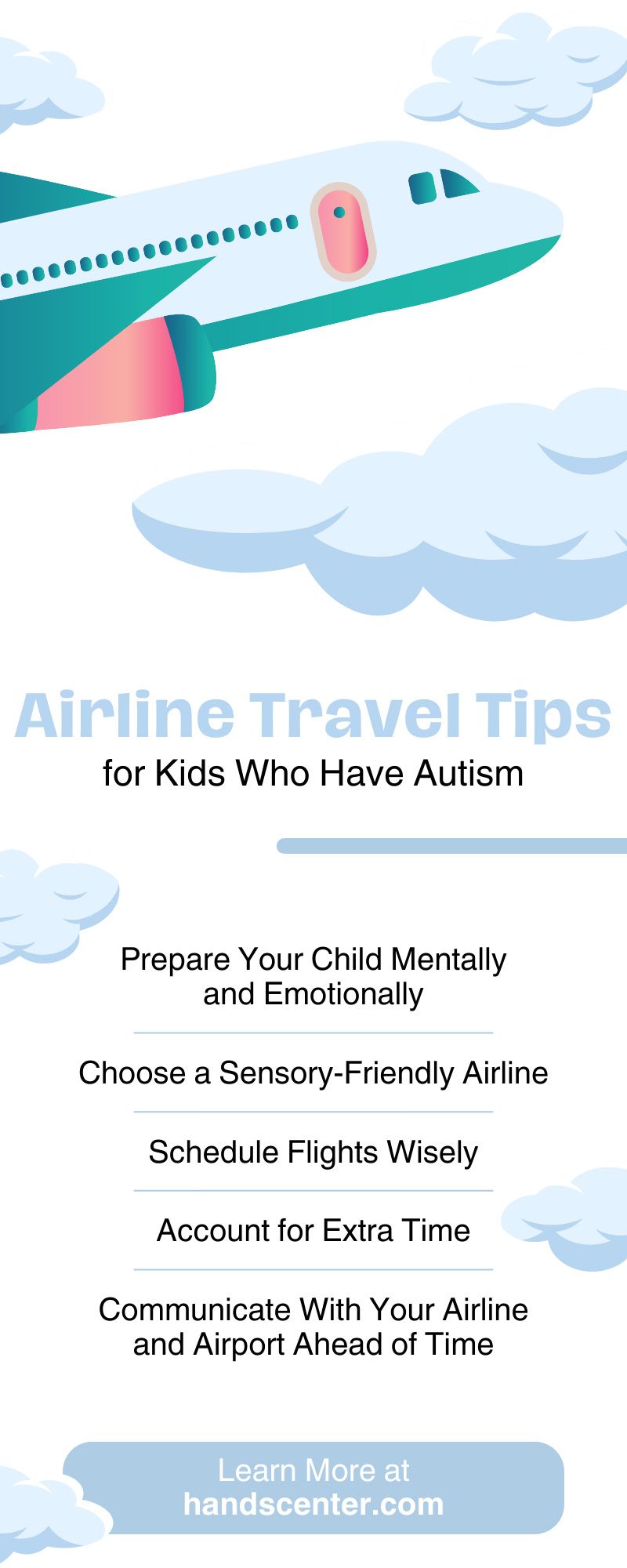8 Airline Travel Tips for Kids Who Have Autism
Traveling by air can often be an exciting experience. There’s something magical about traveling through the clouds. However, planning a trip by air can be challenging, particularly for children with Autism Spectrum Disorder.
Airports can be overstimulating. The unfamiliar surroundings, the noisy crowd, and the changes in routine can all contribute to stress and anxiety. Luckily, with careful planning and preparation, parents can make the journey smoother and more enjoyable.
Here are eight valuable airline travel tips for kids who have autism to create a more comfortable and stress-free travel experience. These strategies extend from pre-flight preparations to in-flight techniques, all crafted to cater to the unique needs of your children.
Prepare Your Child Mentally and Emotionally
Embarking on air travel with a child, especially one with autism, can be overwhelming. Gradually educate your child about the airport environment, security checks, and in-flight procedures to ease the process. Visual aids and social stories are immensely beneficial, so aim to create a visual representation of the steps involved in air travel.
You can search educational videos online to show your child the step-by-step routine at the airport. Discuss the airport layout and the roles of airport personnel. Teach in-flight safety procedures and entertainment options for a more comfortable journey.
Choose a Sensory-Friendly Airline
Major airlines have been making air travel more accommodating for individuals with autism. They provide designated quiet areas in airports and planes where people with autism can retreat if overwhelmed or overstimulated. Some airlines have sensory-friendly lounges, too.
You can also ask for priority boarding for passengers with autism, which allows them to board early. Staff also undergo sensitivity training to better support individuals with autism. Be sure to contact your airline ahead of time to inquire about available services for a comfortable and stress-free trip. Air travel can now be accessible, enabling individuals with autism to explore and create new experiences.
Schedule Flights Wisely
If you’re a jet setter, you understand the importance of scheduling your flights wisely. How you schedule your flights will make a major difference. If you’re traveling during a busier time, planning your itinerary is vital to lessen the stress on everyone, including your child. Try to look for non-stop flights to eliminate stress from layovers and connections. It would be best if you also considered your child’s schedule. This way, they can resume their regular sleeping, eating, or activity routine as soon as you land.
Account for Extra Time
Along with planning your trip wisely, you should also account for any extra time needed. Long lines at check-in counters, security checkpoints, and unexpected delays can cause unwanted stress. Allowing for a buffer to deal with unforeseen delays is crucial. Arriving at least two hours before your flight’s departure time (or three hours for international flights) will give your family enough time to check luggage, clear security, and navigate the airport leisurely.
Ensure you stay informed of any changes by arriving early and having time to adjust. Additionally, having ample time at the airport allows your family to relax, shop, or grab a meal before the flight.
Communicate With Your Airline and Airport Ahead of Time
To ensure a smooth and stress-free traveling experience, plan your trip and inform the relevant authorities about your child’s requirements. They can notify your airline and airports about any accommodations your child needs.
Airports offer services like TSA Cares for passengers who have special accommodations. Contact TSA Cares before you depart for assistance with security screenings. They will provide guidance and accommodations for those who have difficulty walking, need medical equipment, or need access to sensory-friendly areas. This service makes the screening process less stressful and faster by allowing you to avoid long lines. It’s available to all passengers with disabilities.
Pack Sensory Items and Comfort Objects
Airports and air travel can be over- and under-stimulating at the same time. Whether they’re overwhelmed by the hustle and bustle of the airport or bored with the actual flight, having sensory and comfort items onboard can make their traveling experience less painful.
Children with sensory processing issues find air travel particularly challenging, as the unpredictable nature of airports and airplanes can trigger sensory overstimulation and cause persistent stress and discomfort.
Parents can take proactive measures to alleviate their child’s distress by employing various items that help their child regulate their senses and coping strategies. Here are some essential tools to consider:
- Comfort objects: favorite blankets, favorite jacket, stuffed animals
- Personal tablet
- Noise-canceling headphones
- Fidget toys: stress balls, sensory brushes, sensory bottles
Prepare for Meal Times
Remember that not all children will enjoy or can eat the food provided. Airlines may not accommodate dietary requirements and allergies. Packaging snacks or a meal is a good idea to ensure your child can eat during the flight. When choosing snacks, consider your child’s preferences and choose nutritious and tasty options, such as fresh fruit, crackers, cheese, or pretzels.
Remember to check the airline’s policies on food and beverages beforehand. Some may allow certain items while others may not. Pack the snacks to make them easily accessible during the flight. By packing familiar snacks or meals and following the airline’s rules, you can ensure your child stays well-fed and content during the flight.
Anticipate Challenges and Stay Calm
As a parent of a child with autism, it can be challenging to anticipate and prepare for all possible scenarios that may arise during travel. Despite meticulous planning, unforeseen circumstances are likely, ranging from flight delays, canceled reservations, lost luggage, and other travel mishaps. These obstacles can be especially overwhelming and distressing for children who thrive on routine and predictability.
Therefore, you must maintain a calm and flexible attitude to navigate these challenges successfully. Modeling a sense of stability and problem-solving skills can help your child feel less anxious and more confident in navigating unfamiliar or unexpected situations.
Air travel for kids with autism can be an enjoyable experience. Families can make their traveling journey fun with preparation and ongoing support from airlines and airport personnel! Be sure to bookmark our eight airline travel tips for kids who have autism to conquer the many challenges airlines present. For more information on how to support your child, check out our autism pediatric therapy services. We’re always looking forward to meeting new learners.







